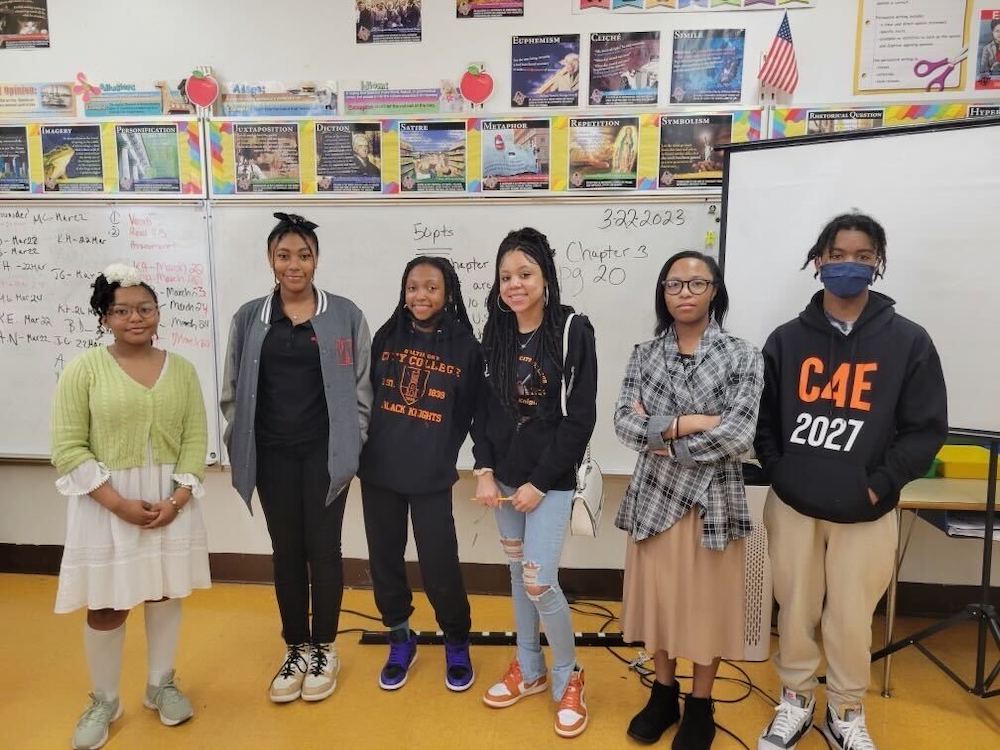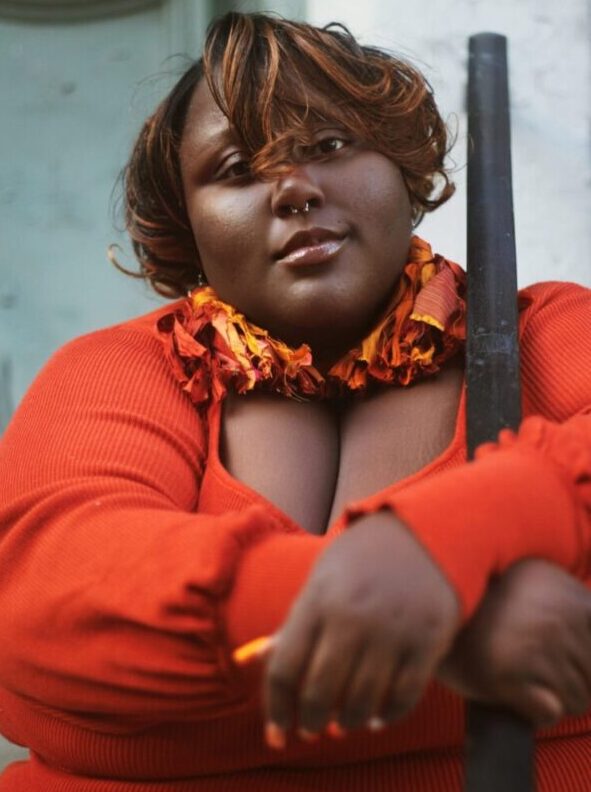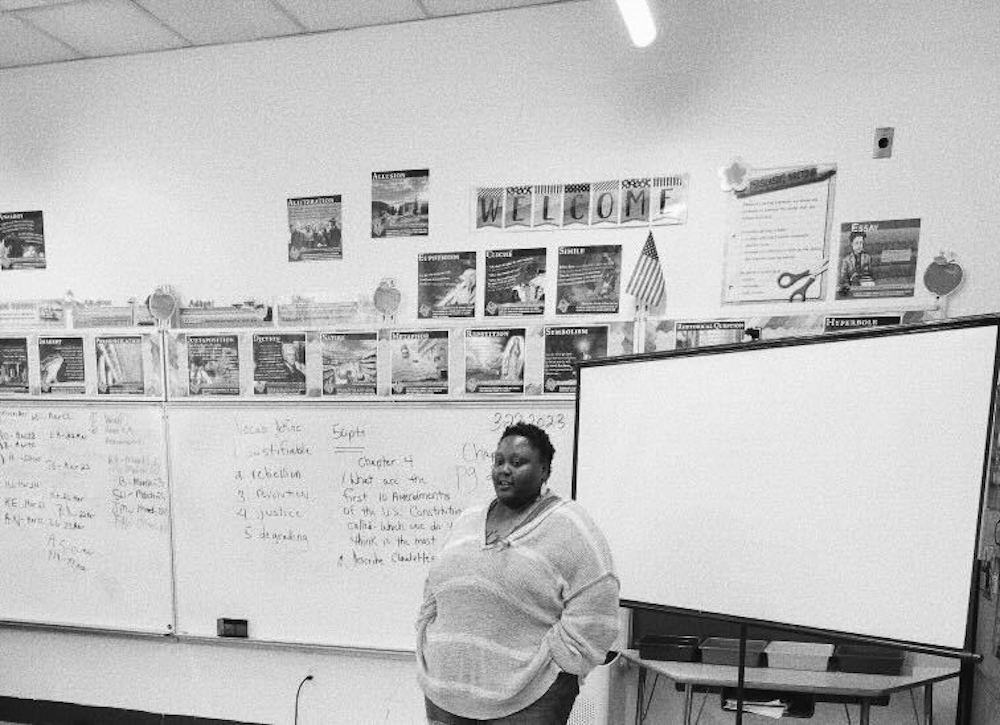One morning earlier this week, drawn by the promise of a continental breakfast, I made my way to Baltimore International Academy. As a lover of fresh baked goods, I couldn’t resist the invitation to rise a bit earlier than usual. But that wasn’t the only reason I went: I was also eager to give back to my city’s youth.
My journey to the school started with a phone call on Tuesday, February 7. My good friend Anthony Lynch had connected me with school counselor Helena Boothe-Sterrett, who formally invited me to share my experiences as a writer with a group of middle schoolers in their school community.
“It’s so important that students see people in their career tracks who look like us,” she said about the opportunity, for which I was invited alongside engineers, architects, firefighters, doctors and health researchers.
We remained in touch via email, counting down the days to the school’s College and Career Readiness Day. I first met Lynch, also known as “Mr. Lynch” within the school community, while working on a project for CHARM: Voices of Baltimore Youth. As a creative entrepreneur in Baltimore, Lynch was recommended to me by his sister for videography services. We worked together to uplift the literary arts organization’s story, as well as the release of “Homegrown: A Message to Baltimore by Baltimore,” through a video.
“Homegrown” is a collection of writing and artwork by Baltimore creators for Baltimore youth that aimed to reclaim our city’s narrative and answer the question: “Where did you find the beauty in Baltimore?” Contributors included B-360’s Brittany Young, Baltimore CeaseFire 365 (now Baltimore Peace Movement) cofounder Erricka Bridgeford and Baltimore City Councilmember Zeke Cohen; it was curated by Baltimore City youth.
In my past life (if we can call it that since I directly apply so much of what I gathered in the various roles leading to my current position), I learned the true power of connecting with the next generation. Being shoulder-to-shoulder with the right people at the right time can propel change in our communities at the speed of trust. Our youth are integral to that and my Baltimore community trusts me to show up — and I was eager to, even while acclimating to a new role as a fulltime journalist. Coming for Career Day was a worthwhile balance.
One of the things I value most in my journey has been my connection to Baltimore, including the relationships I build across generations. For instance: my new association with Deonte, an eighth grader who served as my student escort for the day. Our conversation about technology turned to ChatGPT, for which he had an especially poignant use case.
“I told [ChatGPT] to simulate a life using my name,” Deonte explained. “So I told her to simulate the life of a man named Deonte Harper. So it basically said that he grew up in a poor family. And he wanted a good education because he had a dream to become an entrepreneur, but he didn’t have money to get the proper college education. So he worked at a grocery store to eventually have enough money to pay his tuition for college. And then, after that, he ended up actually having a successful business selling soap and candles.”
Although he confirmed that he doesn’t aspire to sell soap or candles, Deonte does want to be an entrepreneur. We then walked into his English and language arts class, led by Dr. Susan Moore, and it seemed that past life of community engagement was right back in front of me. A class of mostly Black and brown students sat before me and I received permission to assign them some classwork, involving students responding to a prompt on loose-leaf paper. Inspired by my current role, which has already brought up so many questions about technology and entrepreneurship, I asked the eighth graders the following questions:
How might technology affect you as you prepare for college, your career and the rest of your life — whether it be positive or negative? How do you interact with technology now and how might you in the future?
Here are some of their answers, shared with their permission and edited for clarity:

Baltimore International Academy students with a teacher, like the ones our lead Baltimore reporter addressed. (Courtesy photo)
Deonte: “Technology is important and essential in society. Today, technology is changing rapidly. Technology and things like phones, game systems and computers are things that are in people’s everyday lives. In the future, I feel like technology will affect society both positively and negatively.
“Sometimes, technology is limited to African Americans. So I feel as though the more technology improves, the less access African Americans will have to it.”
Mariah: “Now, the way I interact with technology is mostly on social media and websites. I feel like that’s safe right now. I think that in the future, AI might affect people’s careers. For example, if someone wanted to be a doctor…But what if scientists and AI creators invent a robot powered by AI that can be programmed to be a doctor? What will they do with doctor positions then?”
Noah: “Right now, technology doesn’t really impact us negatively…Right now, it’s actually pretty positive. In the future, it might be tough to find qualified people for certain jobs because students who are in school now might just be able to rely on technology to do the work for them once they are ready to get jobs.”
Mamadou: “Social Media and mobile devices may lead to psychological issues such as eye strain!”
Khamari: “The future of technology will be dominated by AI and machine simulators. Virtual reality will become more immersive and the internet will continue to expand, enabling everyday objects to be connected and controlled remotely. Blockchain technology will revolutionize the way we secure and interact with data and the way we conduct financial transactions. Don’t even get me started on quantum computing!”
Khari: “Emerging technologies might make things harder to focus on.”
Christian: “Technology, as it stands now, is revolutionary. 100 years ago, people predicted flying cars and domed cities. We never predicted things like virtual reality. Putting on an oculus and being transported to new areas on the spot. We have magical rectangles [phones] to speak with people overseas. Let’s be real, it’s only going to get better. I can’t wait to have a robot cook for me for free. Like, my favorite foods on the spot? I’ll be flabbergasted.
“No matter what, technology is going to get better, and I feel like it’s going to make us as humans feel like we can’t keep up. Right now, we deal with Black vs. white, but then it’ll be us vs. them…humans and technology.
Aseda: ”In the distant future, I might use things like AI for writing, like to get a resume or a job application. I could use social media to promote my business. I’m sure that other people are using AI to profit from things already. I’m just not really sure if AI-generated content is ethical because at some point we just won’t be able to tell the difference. People with bad intentions could use that for profit or money.”
Kima: “Personally, I don’t think technology would affect people as much in the future because it really isn’t that serious, in my opinion. As of right now, technology is really not even doing anything that bad. Now, if all of that changes and does affect me, then I’ll probably just try to make the best of it. Since people like myself might struggle with the changes, I feel like there should be instructions and information for us to follow so we can have knowledge on everything.”
Before you go...
To keep our site paywall-free, we’re launching a campaign to raise $25,000 by the end of the year. We believe information about entrepreneurs and tech should be accessible to everyone and your support helps make that happen, because journalism costs money.
Can we count on you? Your contribution to the Technical.ly Journalism Fund is tax-deductible.
Join our growing Slack community
Join 5,000 tech professionals and entrepreneurs in our community Slack today!

The person charged in the UnitedHealthcare CEO shooting had a ton of tech connections

The looming TikTok ban doesn’t strike financial fear into the hearts of creators — it’s community they’re worried about

Where are the country’s most vibrant tech and startup communities?


